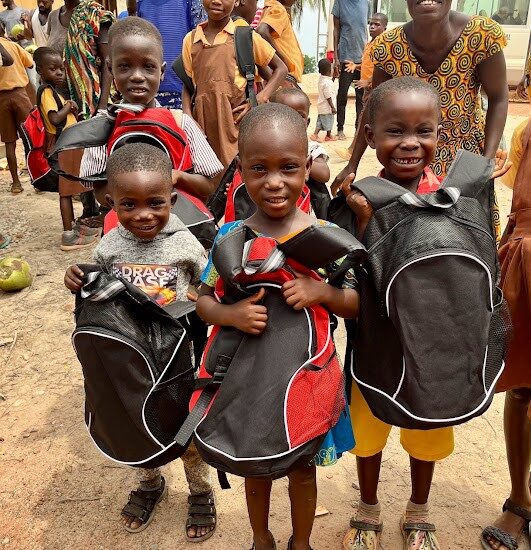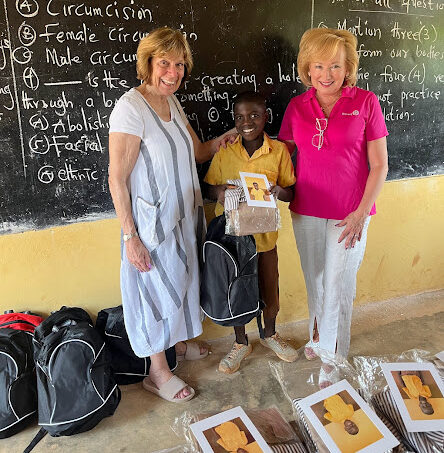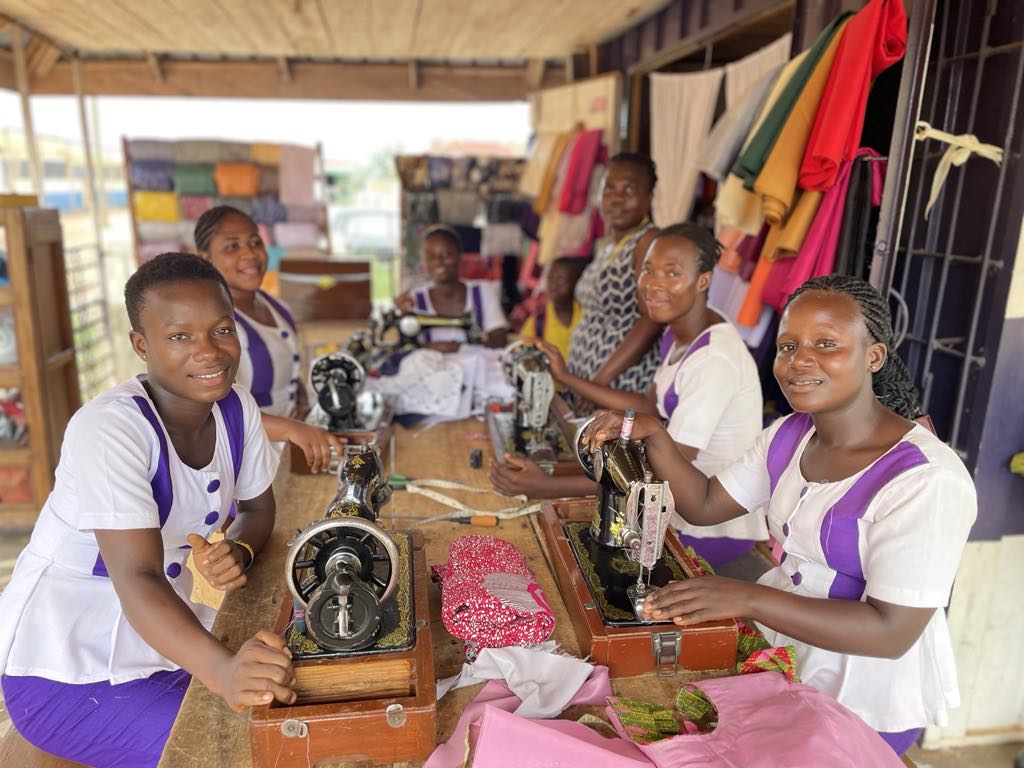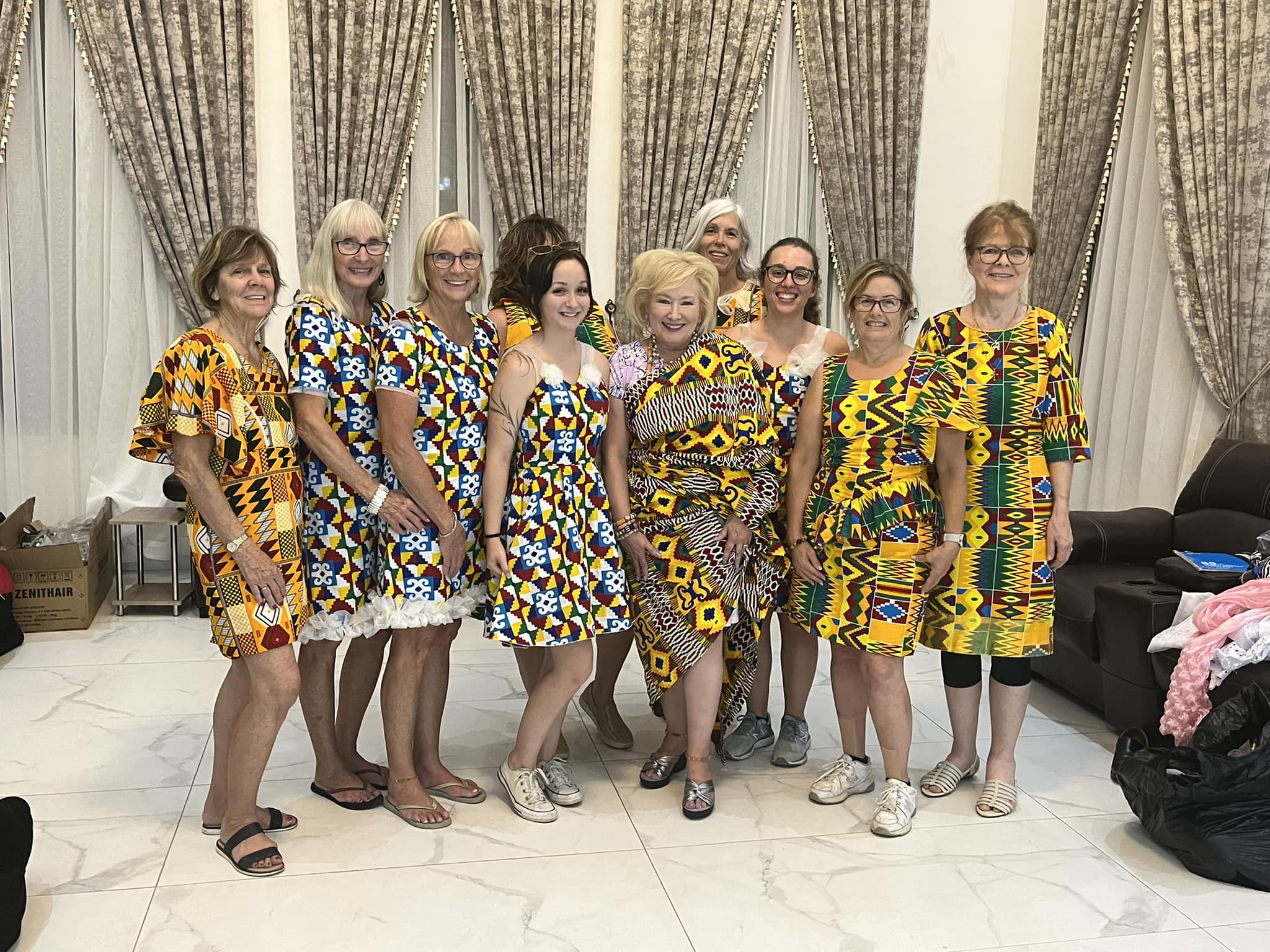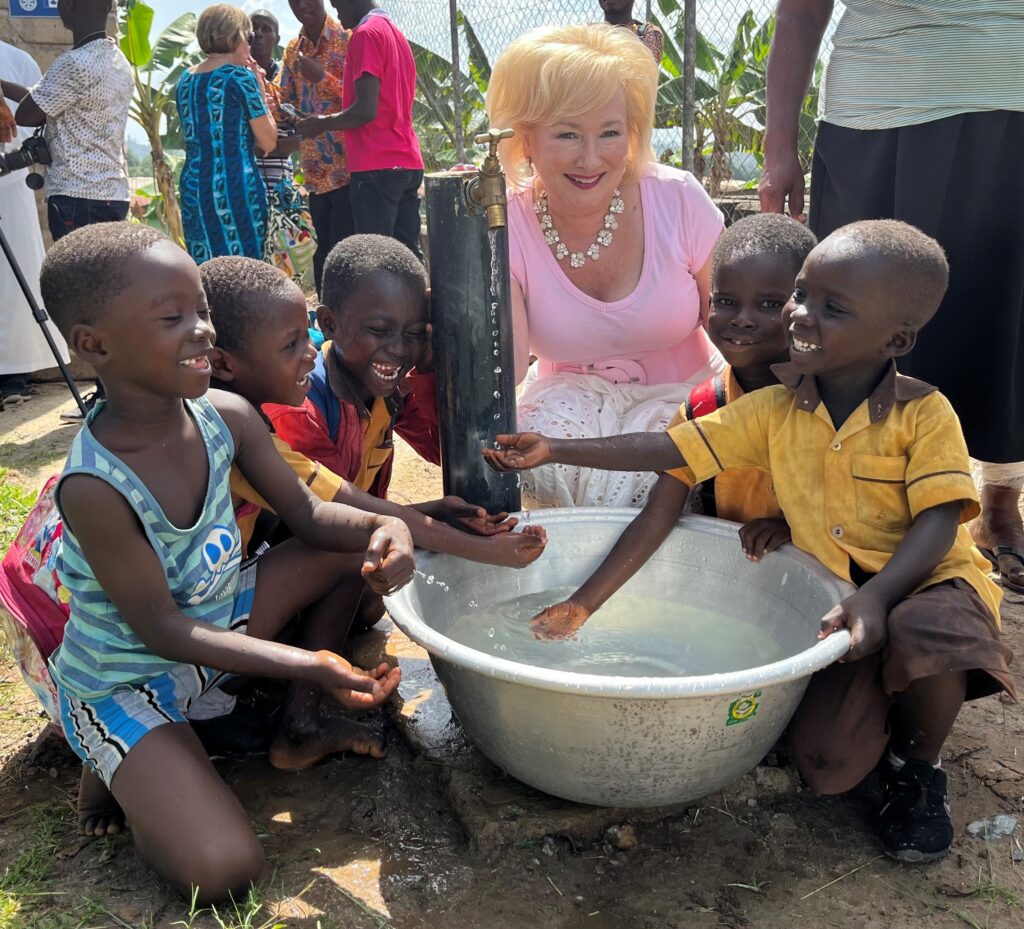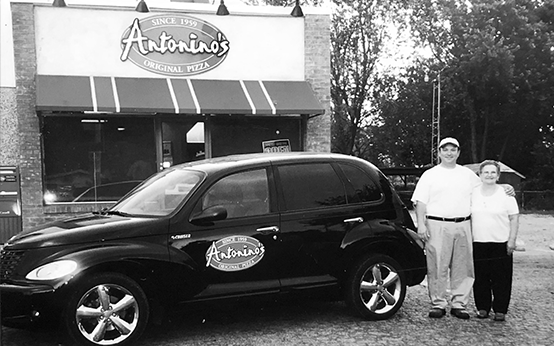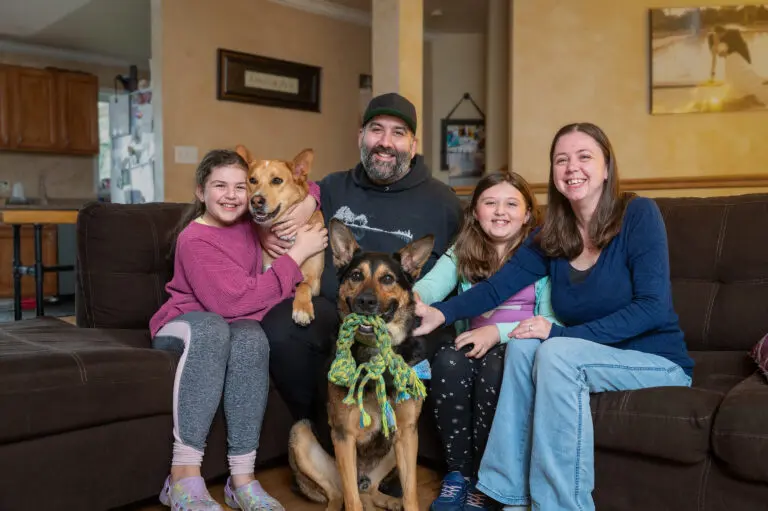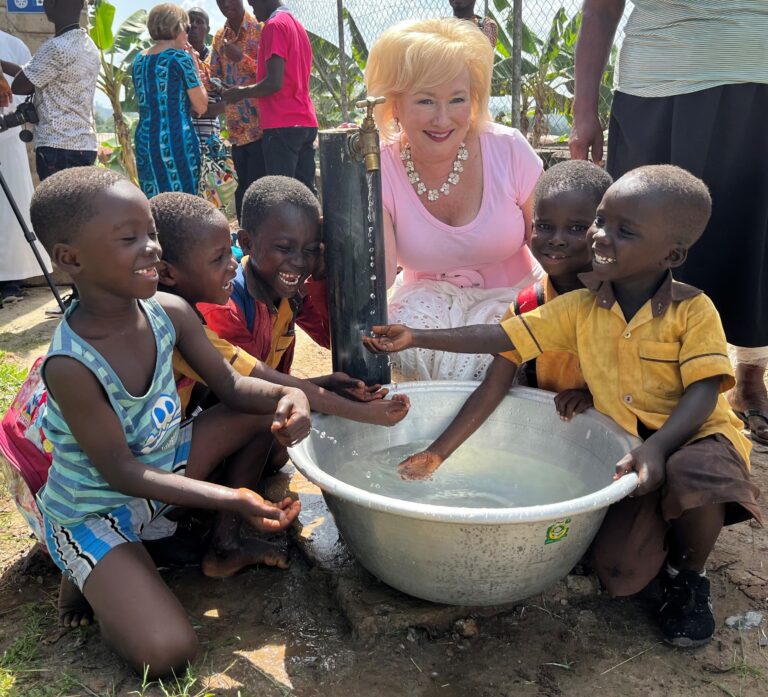A Windsor Rotarian lives by Mother Cabrini’s mantra: “Begin the mission and the means will come.”
The unrelenting sun glared down from the cloudless sky above Kotobaabi, Ghana. It did little to diminish the excitement and goodwill pulsing through the durbar. The landscape and dwellings of the village were dusted in muted earth tones. The newly built school stood out like a beacon. Brightly dressed people of the village gathered at a durbar, a grand celebration featuring traditional music, performances, and readings of poetry. The occasion for this durbar was for the commissioning of the school built by members of the volunteer team from Rotary’s humanitarian mission, led by Kim Spirou of Windsor, Ontario. At this gathering, the team presented the school and its students with gifts: backpacks, textbooks, new school uniforms, teaching aids, soccer balls, and soccer uniforms.
A member of the Rotary Club since the early 1990s, Kim has journeyed to Ghana eight times since 2012, leading humanitarian missions peopled by volunteers—not all Rotarians—undertaking projects, such as drilling water wells, building sanitation facilities with flush toilets and showers, schools, and bringing medicine to the region. The ages of the mission’s volunteers range from seventeen to eighty years. This was the eighty-year-old gentleman’s third mission, and he is interested in going again.
The group travels from Detroit to New York and from there flies to Ghana and journeys to a town called Subinso.
“We stay at a guest house there,” Kim says. “Subinso serves as our home base. From there we travel in a minibus we rent from a local hospital that takes us to the outposts where we do our work.”
Conditions are stark and simple. Travel involves series off-roading through unforgiving terrain. The outposts—with populations of 400 to 500 people; Kotobaabi among them—are as far as two hours away from Subinso.
“On the most recent mission,” Kim explains, “we oversaw the drilling of seven wells, all funded by local donations.”
This is no small, feel-good project. Drilling a water well costs $10,000. In the past ten years, Kim has been involved in the drilling of sixty wells. Each well is life-changing for the people who draw water from it and will last multiple generations.
It all began three decades ago when Kim took a job at the school board. Her boss was a Rotarian.
“He took me to a couple of Rotary Club meetings and said: ‘You have the head and heart of a Rotarian,’” Kim remembers. She joined, thinking it might be a good way to meet new contacts and expand her network.
In the fullness of time, the Rotary Club proved to be far more than that for Kim.
Ten years after joining, Kim attended a Rotary Club conference and was moved by a presentation about a project in Nicaragua.
“They had been hit by a hurricane and thousands of people didn’t have homes anymore,” she recalls. “Many people lived by scavenging in garbage dumps—kids with sticks and hooks in their hands trying to find something salable.”
That presentation inspired Kim to travel to Nicaragua to see the situation for herself. It was more than she expected.
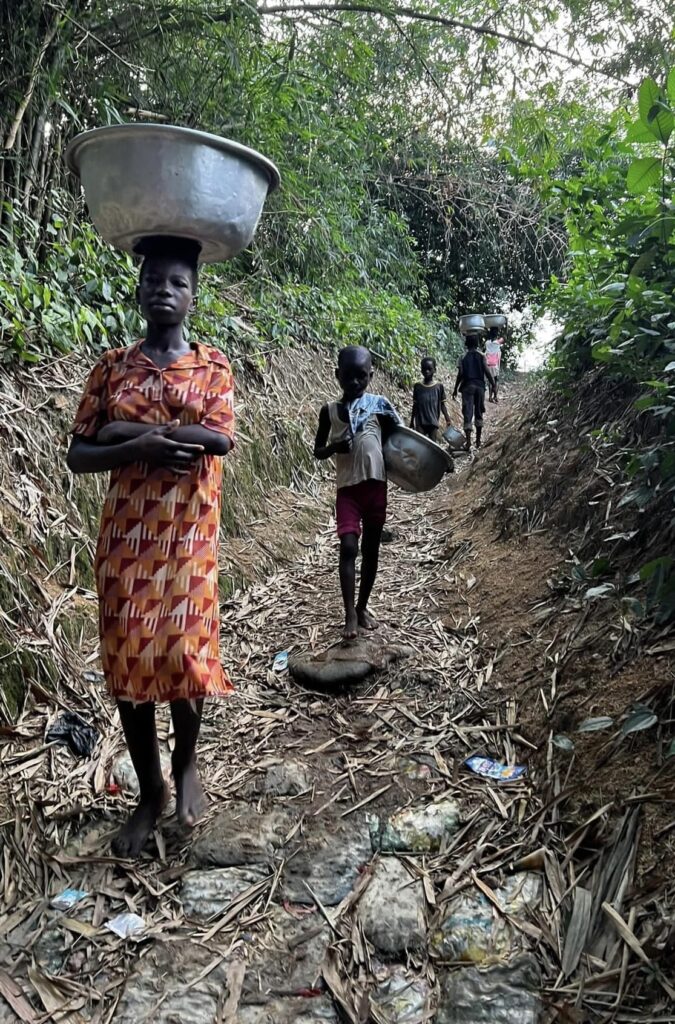
“Once you go there and see the sights and smell the smells, it gets real—fast,” she says. “The Nicaraguan government was not stable. The Contras were still around clashing with anti-Contras. Citizens were being disappeared. I knew how blessed we are here in Canada. I thought: ‘I need to give something back.’”
Later, when working at a Windsor hospital, Kim met a delegation from Ghana as they toured the facility. A member of the cardinal’s entourage was Father Stephen Amoah Gyasi. Kim spoke to him about her experiences in Nicaragua, and Father Stephen said to her: “Would you consider another international trip? Would you come to Africa?”
Adventurous as she may be, Kim doesn’t just dive into things without doing her research first. She got to know Father Stephen, and his work, through correspondence. After a time, Kim learned enough to convince her that Father Stephen was the real deal.
“Father Stephen dedicates his whole life to seeing the needs in his area, trying to find people who can help address them,” Kim says. “He is the closest thing to a living saint that I’ll ever meet.”
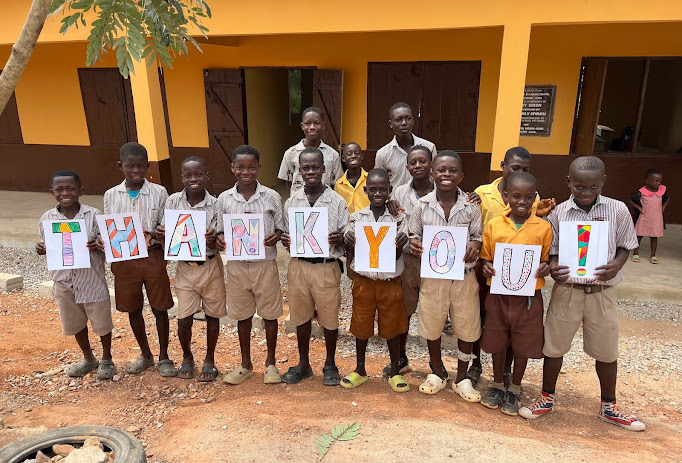
In 2012, Kim made her first of eight missions to Ghana.
She is quick to note that she travels with a team of volunteers, each of whom pays their way—all donations go directly to projects. There is no requirement that volunteers be Rotarians. Everyone is welcome. The only prerequisite is a desire to help.
Good intentions, though, will only get one so far. There are a lot of moving parts behind the scenes. Knowing how to navigate that world is crucial. For instance, being familiar with Health Partners International Canada (HPIC), which is a national organization comprised of pharmaceutical companies.
“Through HPIC you can apply for travel packs that come in fifty-pound boxes,” Kim explains. “I paid $2000 for medicine for this mission, and they gave me approximately $20,000 worth of anti-malarial, the number one killer, lots of antibiotics, analgesics, but no narcotics.”
Every box contains toys and the most appropriate medicine for the region where the mission is going.
Kim’s husband, Christos Spirou, is a family physician who accompanies Kim on her missions.
“He was with us for seven days because his patients back home can’t go much longer without him!” Kim says. “So, from the crack of dawn until there is no light, Cristos sees patients—approximately six hundred every time he goes.”
Other projects completed during the mission included the distribution of mosquito nets, eyeglasses, the construction of a health care clinic and birthing centre, and a pop-up baby store.
One of the most important and successful initiatives is Sewing Seeds of Hope Apprenticeship program, which Kim started in 2015 when Father Stephen introduced her to a fifteen-year-old girl named Esther who was pregnant with her second child.
“Teenage pregnancy is very common,” Kim explains. “When a girl becomes pregnant, she can’t continue in school. Once they are showing, they’re kicked out. Their families feel shame and disown the girls. They’re left on the street. They have no skills, haven’t finished school, and have no means of surviving. Some of them turn to palm oil production—these women work outdoors at cauldrons, stirring with long sticks, in scorching heat over a heat source, boiling oil. It’s honestly horrifying, but that’s what they have to do for twelve or fourteen hours a day. It’s that or they turn to the sex trade.”
The story struck home for Kim because her daughter was approximately Esther’s age.
The program provides each young, single mom with a sewing machine and matches them with a mentor—a business owner who runs their own shop—and teaches the girls to sew during a one- or two-year apprenticeship.
“They don’t buy fast fashion in Ghana,” Kim says. “They make their own clothes. Tailors and seamstresses are in demand. The barrier is having a sewing machine, which costs a hundred dollars U.S.”
With Kim’s help, Father Stephen got a sewing machine for Esther and the program grew from there.
“We have done approximately five hundred sewing machines up to now,” Kim says.
In 2017, the program was expanded to include hair dressing in order to provide meaningful training to those who may not be interested in sewing.
“Hundreds of girls have gone through this apprenticeship program,” Kim says. “It’s transformational for them. They have a skill for life.”
Kim has witnessed, firsthand, people’s willingness to help others, and how meaningful that help can be.
“Everybody has the capacity to transform lives,” she says. “It’s just a matter of putting yourself out there, to sign up. It’s extraordinary what ordinary people can do with a little effort. I challenge each person on the team to raise $2000 and they usually exceed that. A cornhole tournament one volunteer organized raised $4000. That sounds like a lot, but it can be done!”
To learn more about donating or volunteering for the next mission to Ghana, Kim can be reached at [email protected].
